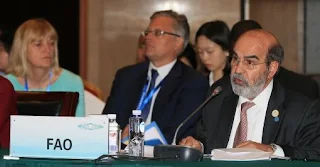A resident of Spencer, Indiana in the United States, Ms Rebecca
Applegate has petitioned
the Congress against the plans to take food out of the mouths of hungry school children,
insisting that hungry children cannot learn in any circumstance, reports
NaijaAgroNet.
The petition on change.org and made available to NaijaAgroNet which has
garnered over 3,330 supporters, Applegate wondered if anyone has been so hungry
they could not concentrate on anything and then imagine being a 6-year-old
trying to learn how to read with an empty stomach.
Applegate, who is a second-grade teacher, noted that in a
rural community where most families struggle to make ends meet despite both
parents working, families rely on the free or reduced cost meals provided to
their children at school.
“Unfortunately, some in Congress are trying to pass a law
that would cut off these meals for many of our most vulnerable children,” she
decried.
According to her, the Improving Child Nutrition and
Education Bill of 2016 currently in the United States Congress, is misleading
as the bill will make it harder for the poorest schools, wondering if schools
like hers would ever qualify for community eligibility.
Community eligibility, Ms Applegate said, is an option for
schools when there are so many disadvantaged students, all students qualify for
free lunch.
“This saves resource strapped school districts from having
to individually track each eligible student in the lunch line and prevents low
income students from going hungry,” she said, stressing that if this bill becomes
law, it would jeopardize approximately 3.4 million students in the 7,000
schools that have already implemented community eligibility.
“My school would be one of them, and I can’t stand by and
let my students go hungry,” she said, appealing for support against allowing
the Congress to take food away from hungry children.
Often, she said, children come to class hungry and cannot
wait to go to breakfast, hence, they are restless and even confess often they
have had very little or nothing to eat the night before.
“I personally pay for peanut butter crackers and other
snacks to pass out mid-morning to keep my students going. Without free meals, I
am not sure what these children are going to do,” Ms Applegate said.
She further enjoined well-meaning individuals to join her in
asking Congress to reject H.R. 5003, the supposed ‘Improving Child Nutrition
and Education Act of 2016’ insisting that hungry children cannot learn.
“We should be feeding and empowering our youth, not leaving
them hungry,” Applegate maintained.
One of Applegate supporters stated that “Even as an adult,
can you read or learn in a hungry situation, the answer is NO, so why wish that
for small ones. It’s the way we treat them now will determine how they will
treat us when we get old and they are in the centre of authorities.”











